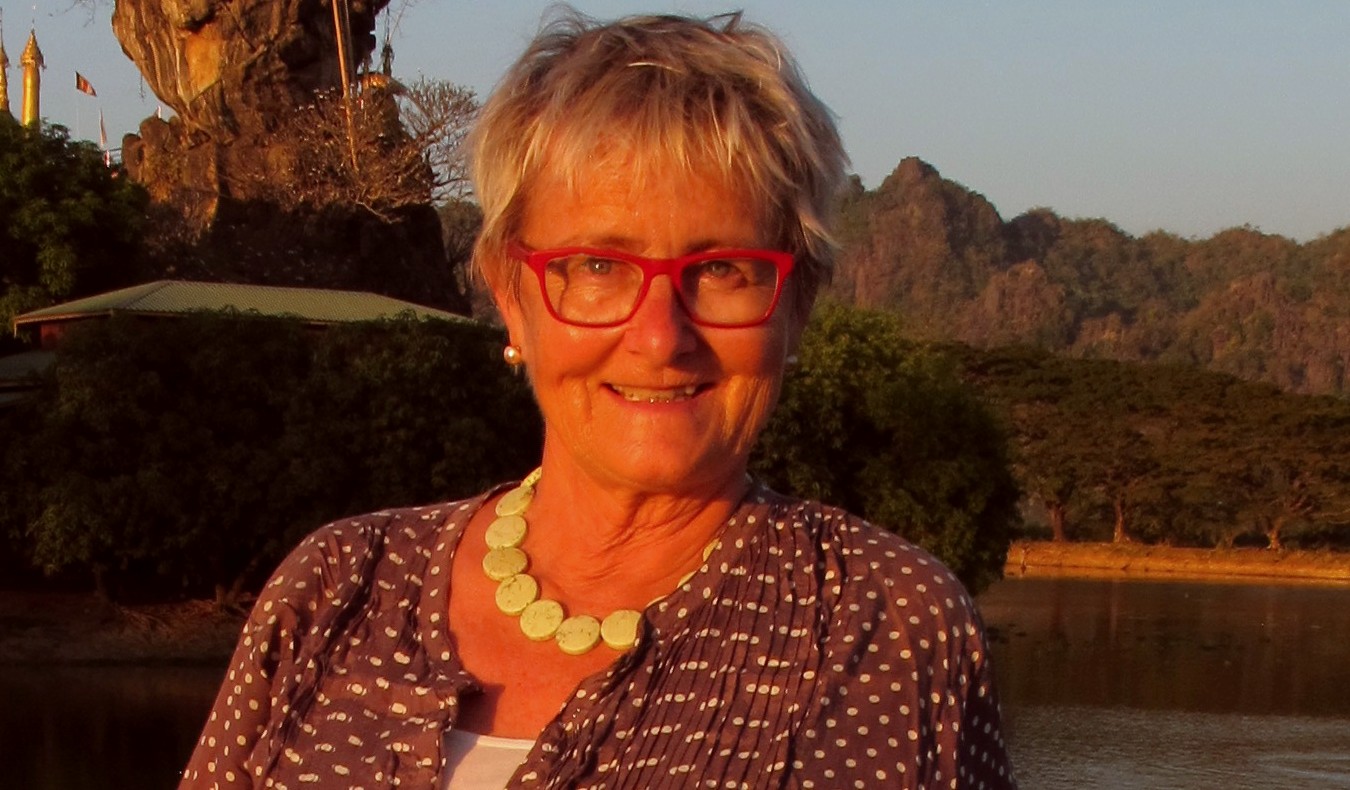
Entering the Sule Shangri-La Hotel in downtown Yangon, Myanmar, is overwhelming. The high-ceilinged lobby is adorned with intimidating columns and large armchairs. An excessive chandelier lights up the huge room. It bears a resemblance of colonial times.
This is the place Norwegian Astri Hole Fredriksen has chosen for the interview. When she first visited Myanmar in 1983, the hotel didn’t exist. It was built in 1996. In fact, not much existed back then.
“It was a little depressing and there wasn’t enough food. But the people were amazing,” says Astri Hole Fredriksen about her first impression of Myanmar.
Astri spent a week in Myanmar on the way back to Norway from working in The Philippines as a consultant for the United Nations for two years. She holds a degree in sociology.
She was amazed by Myanmar, but she didn’t imagine ever living in the underdeveloped country. Yet, when Astri was 41, she moved to Yangon with her husband Jørn in 1991.
“I was extremely excited about going back.”
The best of both world
After living in Myanmar from 1991 to 1994, Astri and Jørn moved on to Vietnam where they spent a few years. They then returned to Europe with their now 25-year-old daughter for the next adventure. Here, they lived in Vienna for two years.
“But we longed for Asia.”
The family therefore moved to Sri Lanka followed by Cambodia before finally returning to Myanmar in 2008. They have lived there ever since.
Astri has always travelled a lot. She got her curiosity for different cultures and countries from her parents, whom have also visited Astri and Jørn, wherever they have lived.
“When it’s in your blood, you get restless easily,” says Astri about her fondness of exploring the world.
She’s from the small municipality of Mandal in the very south of Norway. She and her husband now have a summer house there as well as north of Aalborg in Denmark.
They go back every year and enjoy the long Scandinavian summer nights for a few weeks before returning to their everyday life in Yangon. This is still where Astri feels at home.
“We get the best of both worlds,” she says.
Her Norwegian passport reminds her of the safety of the Scandinavian welfare state, while she still gets to live an “exciting life” travelling.
“When I’m in Myanmar I don’t think much about Norway. But when I’m back (in Norway) it feels like the best thing in the world,” Astri says and adds that her and her husband are planning to settle in Denmark when they retire.
Going to Thailand for chicken
Living in Myanmar for many years, Astri has experienced several stages the country has undergone in the period.
In the early 1990’s she especially had to adapt to the lifestyle, which was nothing like what she was used to in Denmark, where she had lived for a while.
“In the beginning, all hotels were state-owned and there weren’t any restaurants. You wouldn’t hang out with locals and you wouldn’t go to people’s home. Everything had to happen in public spaces,” Astri tells.
“The expat environment was also really small, so everyone knew each other.”
Buying groceries was also a different procedure than the usual. Not all foods were available, and if the couple wanted chicken for instance, it meant taking a trip to Thailand.
Yet, it appeared to be an easier task than staying up to date on the news.
“We didn’t know much about the rest of the world in the 90’s as there were no news in English. But it was actually quite enjoyable,” Astri says.
Today, globalisation has also reached Myanmar and everything is available. You can get pizza, cocktails, new clothes and whatever else your heart desires.
“It’s a different country now. Things have changed so much,” she says and adds that they can no longer leave the car unlocked.
She’s happy for Myanmar, that it’s changing, though she also liked the idyllic picturesque country, she first fell in love with in 1983.
One thing that has always been the same to Astri, however, is the level of safety. Even as a woman, she has always felt comfortable in Myanmar.
“Foreign women are allowed more freedom than local women. We are not judged, because locals acknowledge that we are from a different culture.”
Introducing Myanmar
Today, Astri is in the tourist business. She can’t open her own bureau as a foreigner, but she doesn’t mind. She’s content being the partner of a local tourist company and having local colleagues.
Her job for SignatureMyanmar is mainly to attract Western customers. The majority are couples and families from Norway and Denmark.
“I know what Scandinavian tourists appreciate. And they trust me,” Astri says.
She organises longer trips for her customers such as cruises for smaller groups.
Astri started her career in tourism about 10 years ago after she had assisted some friends in extending their business of cycling tours to Vietnam. It inspired her to start her own.
“I started it for my own sake,” she says.
Even though she had visited as a tourist herself in the 1980’s, Myanmar wasn’t big on tourism yet. But Astri eyed the opportunity to introduce Myanmar to Scandinavians.
“Scandinavian tourists are extremely polite and respectful. They are experienced travellers and they spend a lot of money when they travel.”
From boom to bust
By the current decade, when Myanmar held its first elections in accordance with the new constitution, the poorly visited Asian country started drawing tourists’ attention.
“Myanmar underwent a positive change and there was a good atmosphere. In 2011 and 2012 there weren’t even enough flights for all the tourists,” Astri says.
“Myanmar isn’t designed for mass tourism. Usually a country chooses which kind of tourism they want to cater for. Do you want to keep it exclusive for some tourists such as in Bhutan, or open for everyone like in Thailand?”
But Myanmar never got to choose, because in 2015 the Rohingya refugee crisis started, and tourists hit the break and reversed.
“The press coverage of the crisis really hurt the tourism industry. It is such a shame.”
As fast as the boom in the tourist industry had come, it was over again.
“The travel bureaus used to line up, now there is one Norwegian left,” Astri says.
“I would have about 1,000 tourists in one season and sometimes six large groups at once. Now, I get about 100 tourists and mostly just one group at a time.”
To Astri, the tourism downturn is a result of hasty judgement based on the current political situation.
“People tend to forget that things take time. Industrially, Myanmar has developed fast, but politically it’s not so fast. Western people are so naive about how fast change happens. We take things for granted.”
A future in Denmark
Though she appears young at mind and isn’t ready to quit working, Astri is turning 70 this Christmas and she knows, that her husband and her will move back to Denmark some day.
Their daughter lives in Denmark and so does Jørn’s children from before the two met. Her social network is the main thing, Astri misses when being in Myanmar.
“We get visits once in a while, but I miss having more friends out here from my generation. A lot of our friends have moved back or to other countries,” she says.
There are perks about being older in Myanmar, however.
“Being old is not a negative thing out here. In fact, I get more respect and people don’t object to me,” Astri says and laughs.





